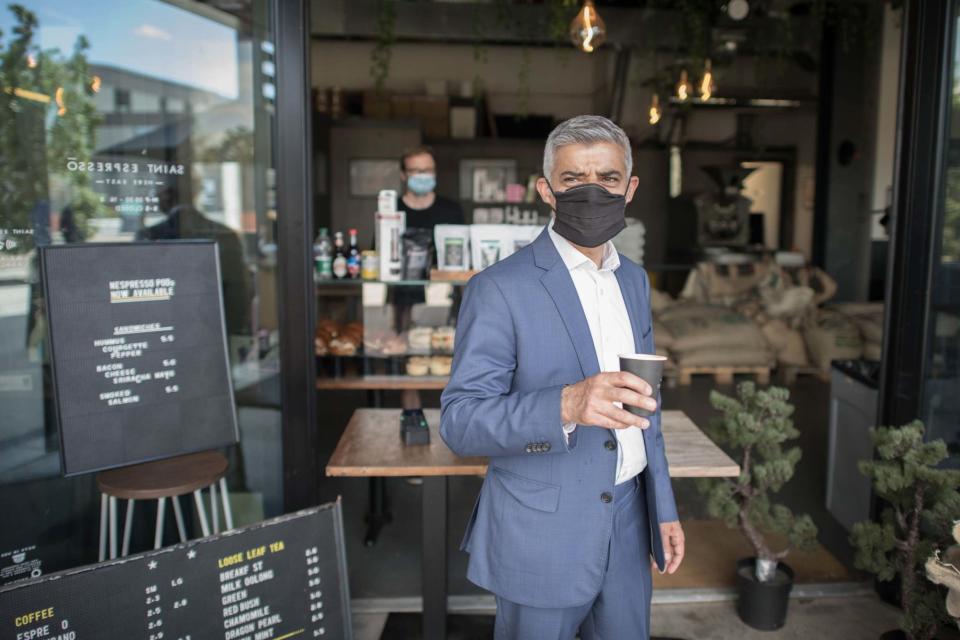Anne McElvoy: Westminster and City Hall must get together to rescue our capital

London is a crucible of the nation’s Covid-19 policy, much as it is the test bed of so much else that influences Britain. This does not always make the capital loved, but it does make it vital at a time when the measure of success for metropolises across the world will not be how glitzy or wealthy they have been, but how innovative they prove themselves in the annus horribilis of 2020 and beyond.
Trade-offs in how to tackle the many impacts of coronavirus have been inevitable. But now that the pattern of recovery looks like a “new normal” of social distancing and sporadic setbacks of scares and spikes in infection, major cities need to place their bets to emerge in good shape from this scourge.
If I have one frustration with our Mayor, Sadiq Khan, it is that beyond demanding an extension to the jobs furlough scheme it is hard to see where the cutting edge of his instincts lies, beyond complaining about what someone else is doing, which is ok re-election politics but not exactly up to the challenge of an epochal threat.
Having written about the pained relationship of every London mayor and the governing party since the days of Ken Livingstone’s internecine war with New Labour and Boris Johnson’s salty standoffs with the Treasury, I am well aware that the City Hall figureheads inevitably game the London-versus-Government position to best advantage.
But there are times to step up to the plate with something more positive to offer.
Khan must be aware, like Rishi Sunak, the Chancellor, that the furlough scheme in its original form cannot go on indefinitely. There are too many unintended consequences, be it in propping up businesses that are doomed or incentivising workers to delay any possible return.
Sunak’s headache, by contrast, is that a worsening of the infection rate in the autumn will test his intention to taper down the arrangement. Labour’s limitation is that it cannot decide what to ask for that is not simply more of the emergency remedies.
City Hall figureheads inevitably game the London-versus-Government position to best advantage
We are now in the tepid middle-period of partial policy solutions that are well-meant but not effective. “Eat out to help out” offers full restaurants on early weekdays; encouraging public transport nudges us to join the legions of masked avengers heading back to the office.
Welcome as they are, they cannot do the job a global capital most needs: getting its workforce into agile shape for a trying year ahead.
Comments by Pimlico Plumbers boss Charlie Mullins that the furlough scheme is “milked by a lot of people who don’t want to go back to work” are abrasive but reflect a truth that more polite employers are painfully aware of, namely that the appetite to return to work for those who cannot do so from home is variable.
But we cannot sustain a state of permanent, universal lockdown, sucking the life out of businesses, when what recovery needs most is jobs and new opportunities, especially for the young. They have least to gain from furlough schemes that offer so little to the “gig” economy.
When a second spike is on the cards and the Government is forced to consider ideas from sequestering the healthy middle-aged to an M25-wide London lockdown, tempers fray. The Mayor feels under-consulted, which he undoubtedly is by a Number 10 machine which is distrustful and inward-looking.
But the best way Khan can put himself on the map of national policy is to lead an innovative agenda that Whitehall and Downing Street cannot ignore — as he did with the laudable clean air commitment.
Simply asking for more money is the old do-you-speak-Labour test — fine for a dividing line with the Tories (not exactly a major threat in London), far less convincing as a way to lead the capital.
Put bluntly, the other reason Downing Street dismissed Khan is that a desire to trade on grievances makes even the reasonable policymakers around Johnson, such as Munira Mirza, who know and understand the frustrations of the mayoralty, loth to open up channels of communication.
They need an olive branch. An astute report by Richard Brown, for the Centre for London think tank, points out that central London has often reshaped what it does to point the way out of recessions, austerity and sundry other times of trouble.
This time, the shift will be harder to master. Residential London these days feels lively: we flock to yoga studios, delight in someone else putting real froth on our cappuccinos, and mask up to enjoy the silent companionship of a (distanced) shared work table in a cafe.

Central London, however, looks like a commuter economy without commuters. That is the problem the Mayor and Number 10’s policy unit need to bridge their injured divide over if they are to address it speedily. Because an empty central London is a curse: a ghost town in the centre of the capital means a hole in the heart of the UK at the very time it aspires to sell its wares globally.
Khan has given a welcome boost to a healthier London by enforcing the ultra-low emission zone to reduce traffic pollution.
Alas, it would be a green politics parody to end up with a centre with cleaner air and a dearth of economic, social and cultural life in the Great Wen. Our streets are changing before our eyes. Covid-19 tests the most valuable commodity we have as Londoners: resilience. To reinvent itself, a bold new policy offer is needed — councils giving relief on commercial rents, which cannot sustain the present shock that leaves more premises shuttered by the week.
It also means tax and rent breaks for smaller new businesses, allowing them a foothold in parts of town where big retailers need to downsize; ways to support restaurants and theatres; and safe and durable urban design.
This all requires co-operation far beyond party and personal gripes. So enough of the grievance fest — let’s get on with the Covid-proofing plan for London.
If we have to stand Sadiq and Munira a flat white or two from a barista of their choice. It would be worth it to get the sulking over — and the capital restarted.
Anne McElvoy is Senior Editor at The Economist

 Yahoo News
Yahoo News 